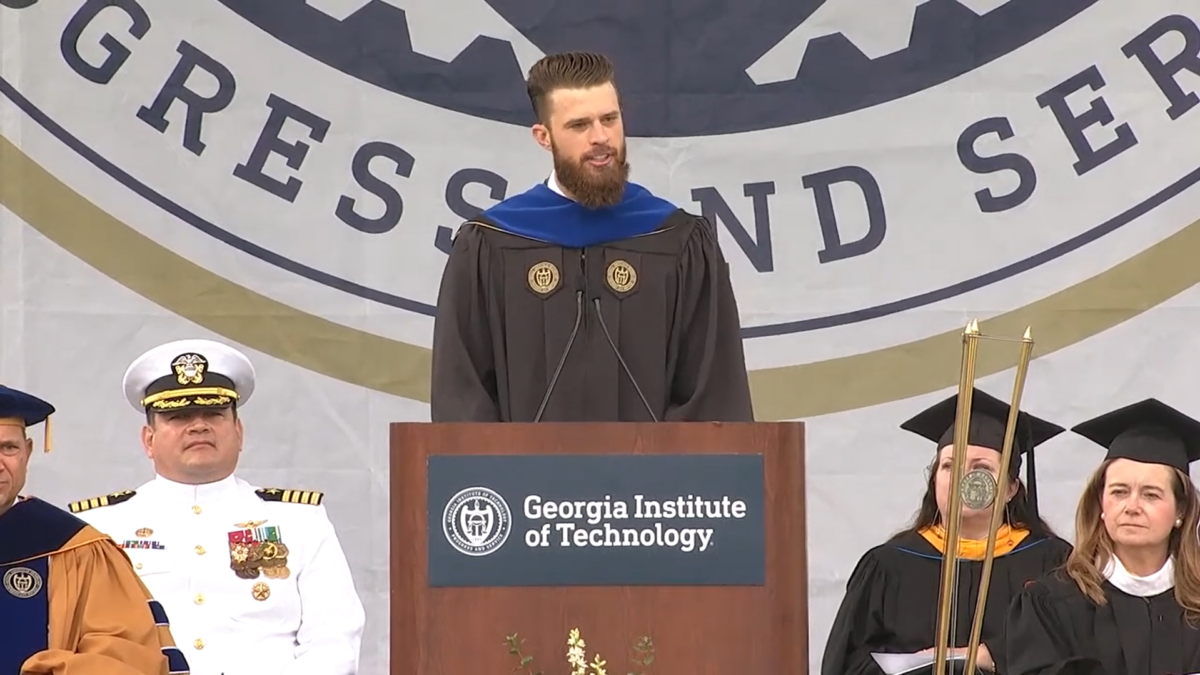In a commencement address at Georgia Tech over the weekend, Kansas City Chiefs kicker Harrison Butker left graduates with “one controversial antidote that I believe will have a lasting impact for generations to come.”
“Get married and start a family,” the two-time Super Bowl champ told the crowd. “I don’t care if you have a successful career. … In the end, no matter how much money you attain, none of it will matter if you are alone and devoid of purpose.”

Butker’s advice is on target, but few young people today are following it. Fewer than half of U.S. households are comprised of married couples (and the majority of those are households without children). In 2018, more than a third of Americans between the ages of 25 and 50 had never been married, and a quarter of young people may never marry in their lives.
:max_bytes(150000):strip_icc():focal(764x49:766x51)/harrison-butker-kids-021323-3-654e93922fad44a3b455913a31b895f9.jpg)
Further, nearly 1 in 5 adults aged 55-64 in 2018 was childless. In a Pew survey, nearly half (44 percent) of “non-parents ages 18 to 49” said they weren’t likely to have kids. By far the most common reason they gave for not planning to have children is they “just don’t want to.”
Unsurprisingly, the decision to ditch marriage and parenthood to instead “keep options open” and chase the ever-elusive duo of “self-love” and self-indulgence isn’t working out well, for lonely individuals or for the country. As Butker noted, “our culture is suffering. … Anyone with eyes can see that something is off.”
“Sadly, we are encouraged to live our lives for ourselves, to move from one thing to another with no long-term commitment,” he continued. “To have loyalty for nothing but ourselves and sacrifice only when it suits our own interests. This loneliness is rooted in the lies being sold about self-dependence and prioritizing our career over important relationships.”

Of course, some individuals who may even yearn for a spouse and children are called to serve in other ways, and people in any stage of life, from preteen to widower, may enjoy equally loving, meaningful, and rewarding relationships as friends, aunts and uncles, siblings, and loving children. (This is one of the many blessings a church family provides for Christians.) But to marry and have children is a calling for which, as human beings, we have been designed since the beginning.

Marriages and families offer purpose: practically, teleologically, and even as a reflection of the greater purpose for which we are all created. From cultivating a home to materially providing for dependents to planning for the future, families help provide a very basic reason to get out of bed every morning. Our work derives more meaning when we return home to our loved ones, not just a frozen pizza and a television screen. The roles of husband, wife, father, and mother, to those blessed enough to inhabit them, fulfill our innate need for telos better than flashy careers or lifestyles. And by providing opportunities to love and serve others — even participating in the two greatest mortal reflections of God’s sacrificial and fatherly love for His people — marriages and families allow us to live as we were created, in the image of God.
They also make us better people. We may learn selflessness, patience, communication skills, teamwork, and humility. And they can make us happier; Butker, a father of two, insisted that none of his football successes “mean anything compared to the happiness I have found in my marriage and in starting a family.”
Families especially influence each generation’s obligations and attachments to the future. Parents naturally have more incentive to conserve society for the benefit and betterment of their posterity. They have a personal stake in the future as well as a heightened sense of responsibility to it.
As Edmund Burke put it, society is a “partnership not only between those who are living, but between those who are living, those who are dead, and those who are to be born.” This intergenerational responsibility links “the lower with the higher natures, connecting the visible and invisible world.” In such a partnership, parents and their children alike should view society as an inheritance to be conserved, transmitted, and improved by each custodian.
Until Christ comes again, creating and committing to marital and familial ties, with their daily sacrifices and rewards, is our best hope for making that generational inheritance a good and lovely one. Every individual on Earth, married or single, parent or childless, will one day relinquish the world he knows to his generational successors. As his worldly achievements pass away, he may hope he has left a mark on the only eternal thing he can: a human soul.
Parents have the gift of being used by God, not just to win souls, but to bring an eternity-bound soul into the world. “We leave our mark on future generations by the children we bring into the world,” as Butker reminded his young audience. “How much greater of a legacy can anyone leave than that?”






